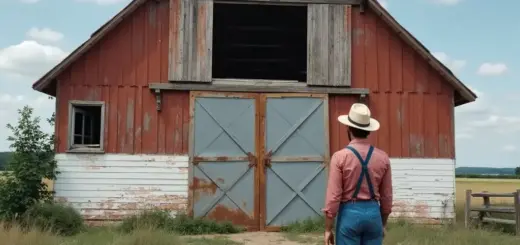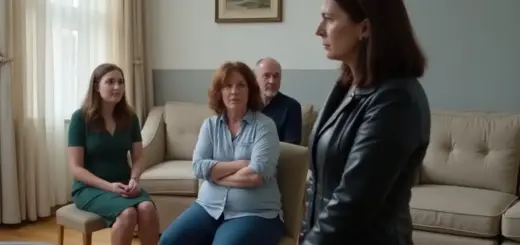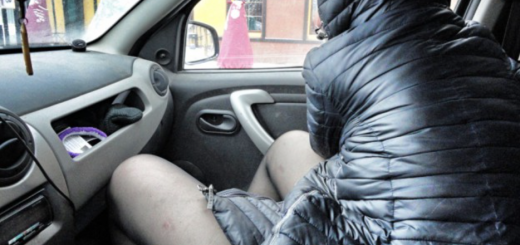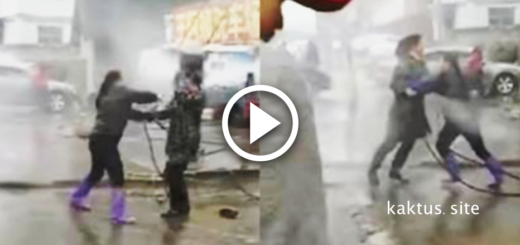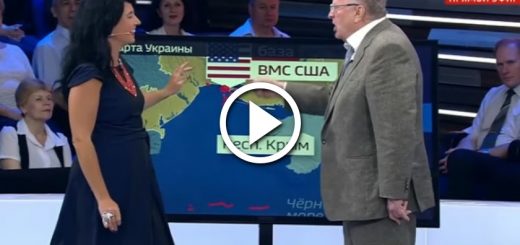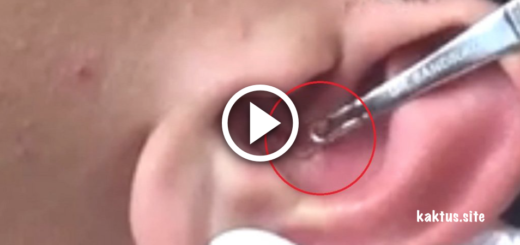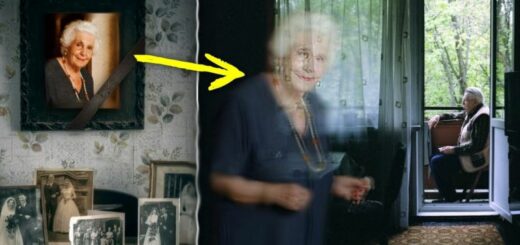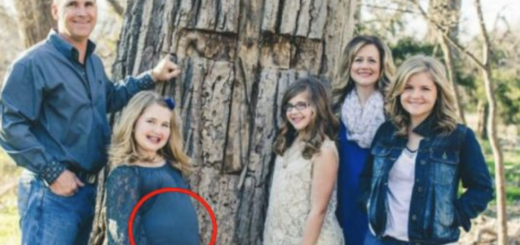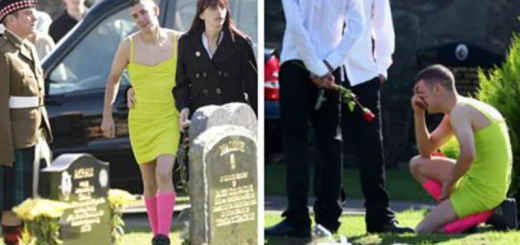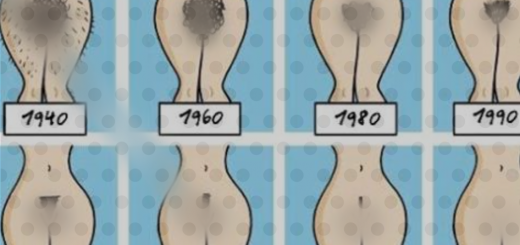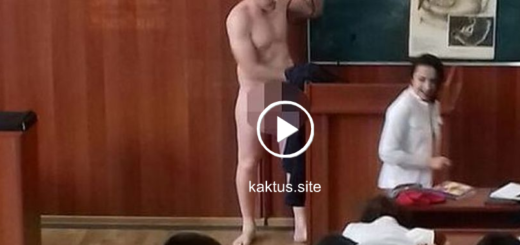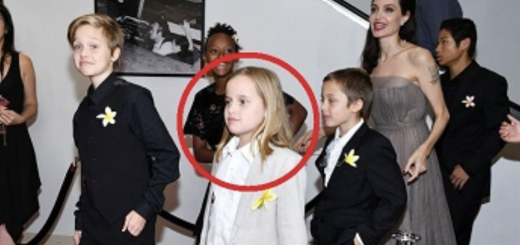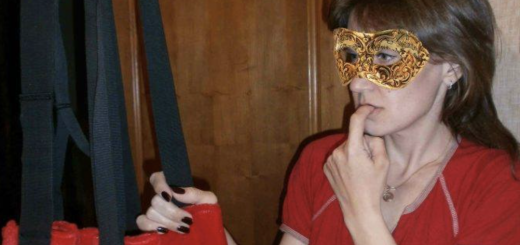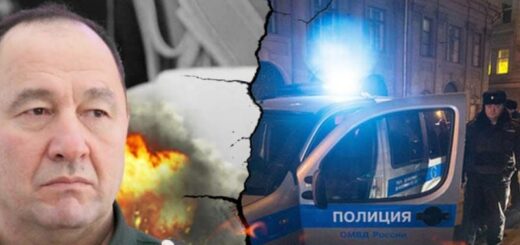Two days later, I sit at a corner table in Riverside Coffee, a manila envelope placed deliberately in front of me. The shop bustles with afternoon customers, exactly as I’d hoped. Richard’s advice echoes in my mind: public places discourage scenes; control the narrative from the beginning. Angela waits in her car across the street, ready if I need backup. Richard is on standby for a call. For the first time since Caleb’s diagnosis, I don’t feel completely alone.
My family arrives together, Victoria leading the procession in designer sunglasses, my parents following like attendants. Melissa trails behind, avoiding my eyes. They take seats around the table without ordering drinks, clearly expecting this to be brief. Victoria immediately reaches for the manila envelope. «So you’ve signed the papers? I knew you’d be reasonable.»
I place my hand firmly on the envelope. «Before we discuss any papers, I want to know why none of you came to Caleb’s funeral.» My mother sighs dramatically. «Destiny, we’ve been through this. Victoria’s engagement was planned months ago. We couldn’t cancel everything on such short notice.»
«It was your grandson’s funeral,» I say quietly. «And we grieved in our own way,» my father replies, glancing nervously at nearby tables. «Everyone processes loss differently.» I open the envelope and slide out several photos, screenshots from Victoria’s Instagram, time-stamped during Caleb’s funeral. Champagne glasses raised, diamond ring flashing, everyone laughing.
«While I was burying my son, you were drinking champagne and laughing.» My voice remains steady, but people at nearby tables glance over. Victoria’s face flushes. «You’re taking those out of context. That’s not fair.»
I pull out a second document from the envelope: the notarized trust terms with «no amendment without grantor consent» highlighted in yellow. «Ethan made his intentions very clear. This money is Caleb’s legacy to me.» My father reaches for the papers. «Let me see that.»
I pull them back before he can grab them. «I’ve spoken with Richard Donovan. He has Ethan’s original statement of intent. The trust cannot be modified, transferred, or accessed by anyone but me.» Victoria’s carefully composed expression cracks. «You don’t deserve that money! You’ll just waste it!» Her voice carries; several customers turn to stare.
«Lower your voice,» my mother hisses. «Why?» I ask, looking directly at Victoria. «Are you worried people will hear how you tried to take advantage of your grieving sister? How you couldn’t be bothered to attend your nephew’s funeral but want his college fund?» Victoria stands abruptly. «This is ridiculous. We’re trying to help you.»
«I don’t need your kind of help,» I say, gathering the papers back into the envelope. «I’m not signing anything. Ever.» My father leans forward, his voice low and threatening. «You’re making a mistake, Destiny. We can make things very difficult for you.»
«You already have,» I reply, standing. «For my entire life. But not anymore.» I walk out, feeling their stares burning into my back. Outside, Angela waits in her car, window rolled down. When I slide into the passenger seat, she gives me a proud smile. «You stood up to them. Good for you.»
My phone rings—Richard calling for an update. «How did it go?» he asks when I answer. «Do we need to prepare for immediate legal action?» I describe the confrontation while Angela drives us away from the coffee shop. Richard listens carefully, then confirms we’re in a strong position legally. «They’ll likely try something else,» he warns. «But you’ve established boundaries, which is critical.»
After we hang up, another call comes through: Ethan’s parents. They offer to fly in from Arizona to testify about Ethan’s intentions if needed. «We always knew Caleb’s care was your priority,» Ethan’s mother says. «We’ll support you however we can.»
A text message follows from Mark, my former co-worker who visited Caleb regularly during his hospital stays. «Angela told me what’s happening. Whatever you need, I’m here.» For the first time in weeks, I feel the weight on my chest lighten. I’m not fighting alone anymore.
In Angela’s driveway, I take a moment before getting out of the car. I touch Caleb’s photo on my dashboard—his last school picture, taken before he got sick, his smile still radiant with hope. «First step done, buddy,» I whisper. Angela squeezes my hand. «You did wonderfully today.» I nod, staring at the horizon. «But they won’t give up easily. They’ll try something bigger next.»
«And we’ll be ready,» Angela says firmly. «You’re not alone anymore, Destiny.» I take a deep breath, feeling something unfamiliar building inside me. Not just grief, not just anger, but resolve. They couldn’t be bothered to say goodbye to my son. They won’t get to decide what happens to his legacy.
Three days after the coffee shop confrontation, I spread documents across Richard Donovan’s mahogany desk, my hands steady as I arrange them into neat piles. Grief still pulses beneath my skin, but something else has emerged alongside it: a cold, clear objectivity that surprises me with its intensity. «They’ll file for guardianship,» Richard says, tapping a finger against a legal brief. His office smells of leather and old books, the kind of place where battles are planned rather than fought.
«They’ll try to prove you’re mentally unfit due to grief. It’s their clearest path to the trust.» I nod, studying the timeline I’ve created: eighteen months of Caleb’s illness mapped out in excruciating detail. «Victoria never does her own dirty work. She’ll use Mom and Dad as the petitioners, maybe even Melissa.»
«Smart observation,» Richard says, genuine respect in his voice. «We need to document every interaction since Caleb’s diagnosis, every hospital visit you made, every appointment they missed.» I pull out my phone, opening my calendar. «I have records of all appointments. I can prove I never missed a single one.» My voice catches slightly. «Not even the day after Ethan left.»
Richard makes a note. «And your parents? Victoria?» «Zero visits. Not when he was diagnosed. Not during the three weeks he spent in isolation after the bone marrow treatment failed.» The memory stings, but I push through it. «Not even when the doctors told us there was nothing more they could do.»
«Document it all,» Richard says. «We don’t move yet. We prepare. We gather evidence. We anticipate their attack. When they come—and they will—we’ll be ready.» I run my finger along a hospital bill, remembering how I’d learned to decipher medical codes and challenge insurance denials, how I became Caleb’s advocate when no one else would. Eight months of treatments and not one visit from them. Not one.
Richard leans forward. «Destiny, I need you to understand something. This isn’t just about proving you’re mentally competent. It’s about proving they never cared about Caleb, only his money.» The words hurt, but the truth in them steadies me. «Then that’s exactly what we’ll prove.»
Over the next hour, we sort through financial statements, showing my meticulous handling of Caleb’s medical expenses. Richard brings in a notary to witness my signing of affidavits. The preparation feels like building armor, each document another plate of protection around Caleb’s legacy. «They’ll claim your grief makes you unstable,» Richard warns. «We need to counter that narrative before they can establish it.»
«Angela has kept a journal,» I say, surprising myself with this knowledge. «She documented every time she helped with Caleb during his illness. She told me yesterday.» Richard nods approvingly. «Perfect. A neutral third party’s observations will carry significant weight.»
I pull out my notebook. «I’ve also contacted Caleb’s primary oncologist and his school teacher. Both are willing to provide character statements.» «Excellent,» Richard says. «Now, what about Ethan? His intention when creating the trust could be crucial.»
«I called his parents last night. They’re coordinating with his attorney to document his original intentions.» The words come easily now, each strategic move clear in my mind. «And I’ve installed security cameras at my house. If they try to confront me again, it’ll be documented.»
Richard makes a note. «I’m consulting with Dr. Elizabeth Warner tomorrow. She’s a psychiatric expert who can evaluate you and counter any mental fitness challenges they might bring.» I hesitate before sharing my next thought. «I’ve been collecting screenshots. Every time they dismissed Caleb’s illness as nothing serious. Every text where they claimed I was overreacting.» My voice hardens. «They created a pattern of minimizing his condition while simultaneously planning to take his trust fund.»
«That’s exactly the kind of evidence we need,» Richard says quietly. «Not just to defend you, but to expose their motives.» I stare out his office window at the autumn leaves dancing across the parking lot. Caleb loved fall—the colors, the smell of cinnamon, the way leaves crunched beneath his feet. Last October, I’d wheeled him outside the hospital just so he could feel the crisp air on his face.
«Are you alright?» Richard asks. «Just remembering,» I say, returning to the present. «What else do we need?» As Richard outlines our next steps, my phone buzzes with a text from Angela. «Just heard from Martha at the hospital. Melissa was asking questions about Caleb’s treatment schedule. Be careful.»
My stomach tightens. I show Richard the message. «They’re gathering ammunition,» he says grimly. «Melissa would have access to information about when you were at the hospital, your emotional state during treatment.» «She’s signed something, hasn’t she?» The realization hits me like a physical blow. «An affidavit claiming I was unstable during Caleb’s illness.»
Richard’s silence confirms my suspicion. «She was my friend since third grade,» I whisper, the betrayal cutting deeper than I expected. «She held my hand through my divorce.» «Victoria is recruiting anyone with inside knowledge of your life,» Richard says gently. «It raises the threat level considerably.»
I remember now: Melissa’s increasingly infrequent visits as Caleb’s condition worsened. Her uncomfortable expression when I broke down after a particularly devastating prognosis. The way she’d stopped meeting my eyes in those final weeks. «She’ll claim she witnessed erratic behavior,» I say, my voice hollow. «And she wouldn’t be entirely wrong. I did fall apart sometimes. Who wouldn’t?»
For the first time since our strategy session began, doubt creeps in. Maybe they’re right. Maybe I am falling apart. I glance at my trembling hands. «Look at me.» «Don’t,» Richard says firmly. «This is exactly what they want—to make you doubt yourself.»
My phone buzzes again. Angela. «Coming by Richard’s office. Found my journals. You need to see these.» Thirty minutes later, Angela walks in, carrying a stack of notebooks. Her silver hair is neatly pinned back, her eyes fierce with protective energy. «Melissa can say whatever she wants,» Angela announces, placing the journals on Richard’s desk. «But I documented everything. Every day you spent at that hospital. Every night you sat up with Caleb when he couldn’t sleep. Every meal I brought because you wouldn’t leave his side.»
She takes my hands in hers. «Don’t let them make you doubt yourself, Destiny. That’s exactly what they want.» The warmth of her hands steadies mine. I look from Angela to Richard, then to the mountain of evidence we’ve accumulated, my son’s legacy protected by truth, documented fact by documented fact. «You’re right,» I say, straightening my shoulders. «I need to prepare for character assassination, not just legal challenges.»
As I organize Angela’s journals into our evidence pile, I realize we’re building more than a legal defense. We’re creating a monument to the truth of who really stood by Caleb when it mattered and who didn’t. Later that evening, after Angela left, my hands shook as I taped the last photo to the evidence board in Richard’s office. It shows my parents at Victoria’s engagement party, champagne glasses raised in celebration exactly forty-two minutes after Caleb’s casket was lowered into the ground.
«That’s the final piece,» Richard says, stepping back to survey our work. The conference room wall has transformed into a comprehensive timeline of betrayal: medical records showing every appointment I attended, financial statements proving responsible management of Caleb’s medical expenses, witness statements from hospital staff, neighbors, and Caleb’s teachers. A documented eighteen-month absence of my family during Caleb’s illness.
«Will it be enough?» I ask, straightening a document that details Victoria’s unauthorized access to Caleb’s medical files. Richard adjusts his glasses, his expression serious but confident. «They’ll file for emergency guardianship claiming you’re mentally unfit, but we’ve anticipated every argument they could make.» He taps the notarized statement from Ethan’s parents. «This alone makes their position legally tenuous.»
I trace my finger along the timeline we’ve created. Eight months of hospital visits, countless nights sleeping in uncomfortable chairs beside Caleb’s bed. The treatments, the hopes, the setbacks, all documented with meticulous care. «I never thought I’d need to prove I was a good mother,» I whisper. «You shouldn’t have to,» Richard says, placing a supportive hand on my shoulder. «But people who want what isn’t theirs will create whatever narrative serves them.»
As if on cue, my phone buzzes with a text from Angela. I read it aloud. «Twenty-three neighbors signed the character petition.» A small victory, but each one strengthens our position. I’ve spent the past week gathering an arsenal of truth against my family’s inevitable attack. Security cameras now monitor my home, recording any uninvited visits. I’ve documented every text, every voicemail, every social media post where Victoria subtly questions my mental state.
«They’re painting me as unstable,» I say, staring at Victoria’s recent Facebook post asking for prayers for family members struggling with mental health issues after a loss. The comments section overflows with sympathetic responses, none mentioning that she didn’t attend her nephew’s funeral. Richard nods grimly. «Classic strategy. They can’t win on legal grounds, so they’re trying to win in the court of public opinion first.»
The phone on his desk rings. Richard answers, his expression darkening as he listens. «I see. Thank you for letting us know.» He hangs up and turns to me. «That was my contact at Memorial Hospital. Someone requested Caleb’s complete medical records yesterday.» My stomach drops. «Who?» «Victoria used an old emergency contact form to gain access.»


